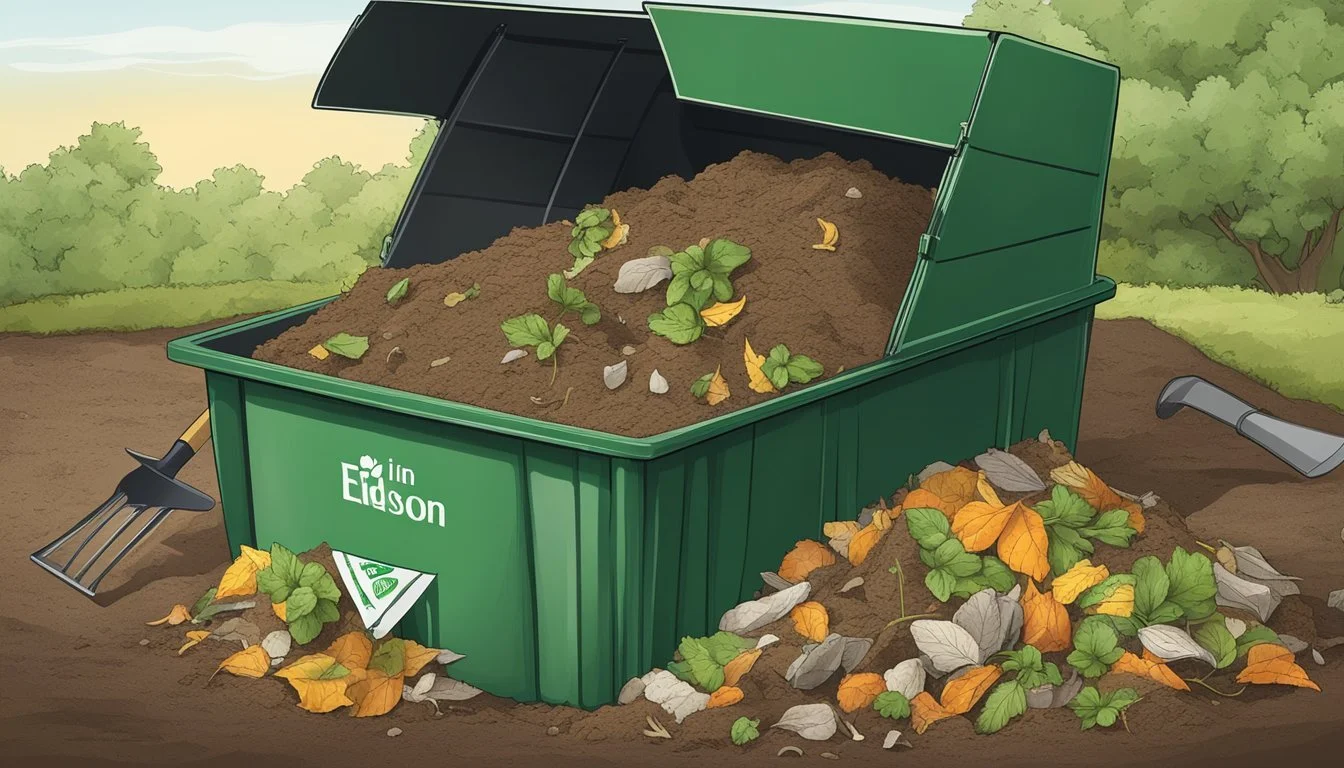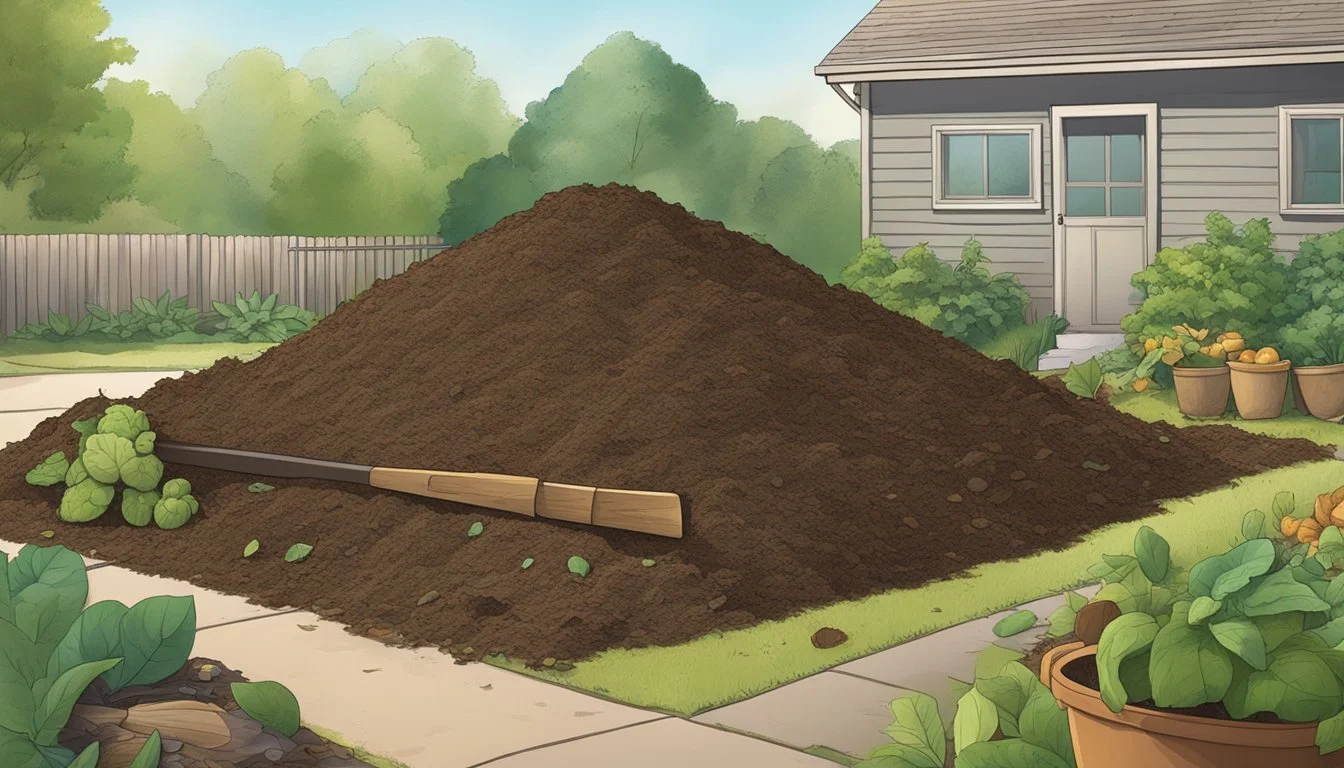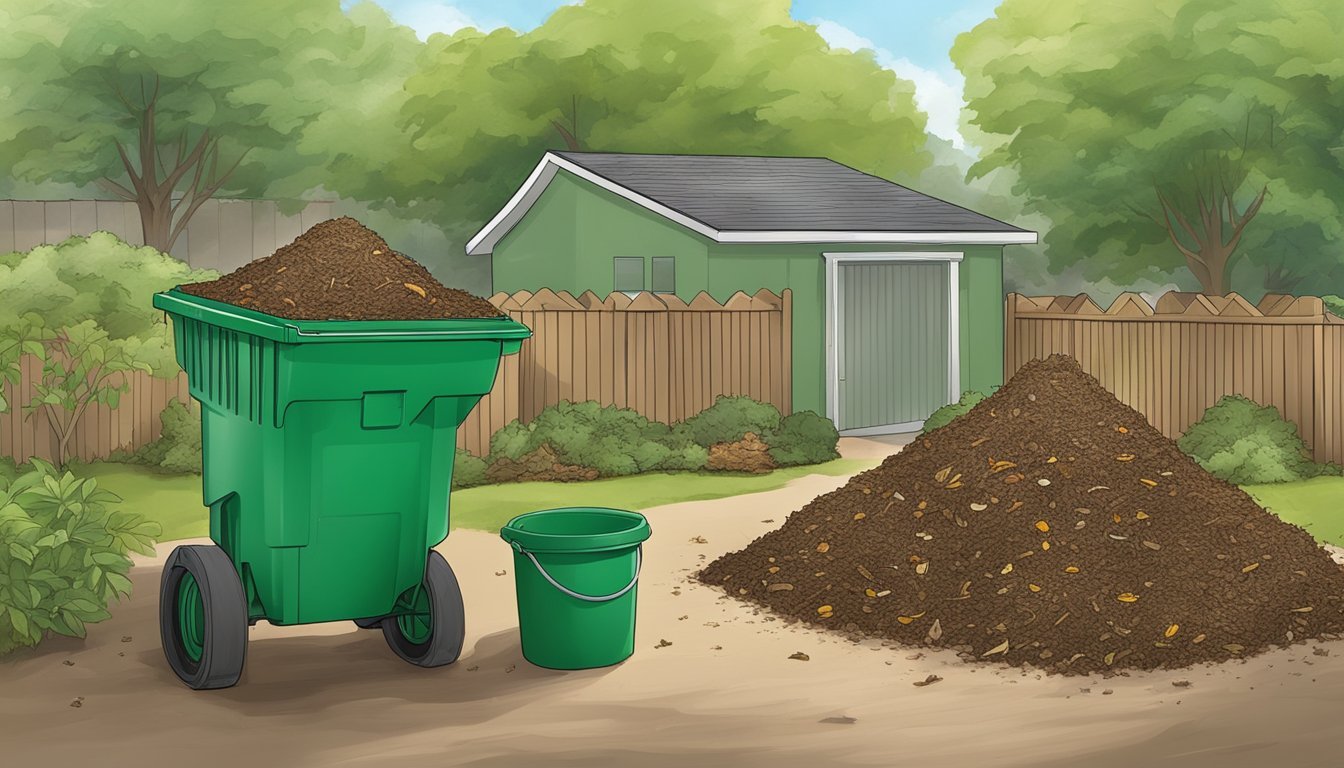Guide to Composting in Edison, NJ
Tips for Efficient Waste Reduction
Composting is a valuable practice for residents and businesses in Edison, NJ, offering an environmentally friendly method to reduce waste and enhance soil quality. By turning organic matter such as food scraps and yard waste into nutrient-rich compost, the community can contribute to a more sustainable future. Edison has recognized the benefits of composting and encourages its residents to participate in local composting activities and education programs.
In Edison, individuals have a variety of options for composting, including backyard setups and participation in community programs. With the implementation of the Food Waste Recycling Mandate, large food waste generators are now required to actively participate in food scraps recycling, which is a significant step towards a greener New Jersey. Furthermore, educational workshops, provided by Middlesex County, facilitate learning and foster community involvement in composting initiatives.
The guidance and regulations set forth by the State of New Jersey support Edison's efforts to manage waste responsibly. Understanding the basics of composting, how to get started, and the resources available within the community can help Edison residents efficiently turn their organic waste into a valuable resource, contributing to the town's waste management strategy and environmental conservation.
Understanding Composting Fundamentals
Composting is a natural process that enriches the soil, promoting healthy plant growth and minimizing waste by recycling organic materials. This section explores the essentials of what composting is, its advantages, and the breakdown process of materials into compost.
What is Composting?
Composting is the managed process of decomposing organic material, such as leaves, kitchen scraps, and yard trimmings, into a valuable soil amendment known as compost. It involves layering 'greens' and 'browns'—nitrogen-rich and carbon-rich materials, respectively—to create ideal conditions for microorganisms to break down these inputs.
Benefits of Composting
Composting offers numerous advantages. It enriches soil, helping to retain moisture and suppress plant diseases and pests. Additionally, composting reduces the need for chemical fertilizers, encourages the production of beneficial bacteria and fungi, and lowers the carbon footprint by diverting organic materials from landfills.
Composting Process and Decomposition
The composting process involves four primary components: organic material, moisture, oxygen, and microorganisms. Decomposition is facilitated by ensuring a balance of these components:
Organic Material: A mix of 'greens'—such as vegetable scraps, which provide nitrogen—and 'browns'—like dried leaves, which supply carbon—is essential.
Moisture: Microorganisms need water to survive and function, so maintaining adequate moisture is crucial.
Oxygen: Regularly turning the compost pile introduces oxygen, aiding aerobic decomposition.
Microorganisms: These work tirelessly to break down organic material into humus, the end product of composting.
Setting Up Your Compost System
When establishing a compost system in Edison, NJ, one must consider the location and the type of compost bin to use. These factors are crucial for creating an efficient system that processes organic materials effectively.
Choosing the Right Location
Selecting the appropriate location for a compost system is vital. A backyard space that receives partial sunlight and shade is ideal, allowing for balanced temperatures that facilitate the decomposition process. It should also be relatively close to a water source to maintain moisture levels and convenient for adding kitchen scraps.
Essential Criteria for Location:
Partial sunlight and shade
Proximity to water source
Ease of access
Selecting a Compost Bin
There are many compost bin options available, ranging from simple, homemade bins to sophisticated, commercially available units. When selecting a compost bin, consider the size of your backyard, the volume of organic materials you'll be composting, and whether you prefer a stationary or tumbling model.
Compost Bin Types for Consideration:
Stationary Bins: Good for larger volumes and static composting methods.
Tumbling Bins: Allow for easier turning of compost material, speeding up the process.
In Edison, NJ, those without adequate backyard space may choose to participate in a community compost program which can be an excellent alternative.
Materials and Ingredients for Compost
In Edison, NJ, successful composting requires a balanced mix of green and brown materials, ensuring quicker decomposition and a nutrient-rich end product. Residents must be judicious about what they include, as certain items can disrupt the composting process.
Green and Brown Materials
Green materials are nitrogen-rich and add necessary moisture to the compost pile. They include:
Food scraps: Fruits and vegetables enhance the nutrient content.
Grass clippings: A common green material that decomposes quickly.
Brown materials provide carbon and help maintain aeration in the compost pile. They encompass:
Leaves: Readily available in fall and a rich source of carbon.
Woody materials: Twigs and branches that ensure air flow within the pile.
A proper balance between green and brown materials facilitates effective composting. For an ideal ratio, a citizen from Middlesex County might follow guidelines from the Rutgers Cooperative Extension Service, which recommends a mix for optimal decomposition.
Items to Avoid in Compost
Certain materials can attract pests or inhibit the composting process and should be avoided:
Meat or dairy products: These can attract unwanted animals and pests.
Weed seeds: If not fully decomposed, they might germinate and spread in garden beds.
Diseased plants: These can transfer illness to other plants when compost is used as soil amendment.
It's important to note that not all organic waste is suitable for composting. For specifics on what to exclude, residents can consult detailed guidelines like those from the New Jersey Department of Environmental Protection's Compost Manual which offers insights for a safe and efficient composting operation.
Maintaining Your Compost Pile
A successful compost pile relies on a balance of air and water, along with proper temperature and moisture levels, to decompose organic matter efficiently. Regular attention to these factors ensures rapid and odor-free decomposition, transforming waste into valuable compost for gardening.
The Importance of Air and Water
Proper aeration helps maintain a thriving ecosystem for microorganisms breaking down compost materials. Without adequate air, the pile becomes anaerobic, leading to unpleasant odors and slower decomposition. On the other hand, water is equally crucial as microorganisms need moisture to survive. However, too much water can displace air and cool the pile, hampering the process. Edison residents can reference the guidance on maintaining a compost pile for techniques to achieve the right balance.
Managing Temperature and Moisture
Temperature regulation is key to effective composting. The microbial activity required to break down organic material generates heat, and temperature reflects the pile's health. A hot pile can reach temperatures up to 140-160°F, indicating a high level of biological activity. To manage moisture, compost should feel like a wrung-out sponge; moist but not dripping wet.
Temperature Range for Composting:
Active Phase: 90-140°F
Curing Phase: Cooler than active phase
When to Turn the Compost
Turning the compost mixes the materials, redistributing moisture, and reintroducing oxygen—essential for aerobic decomposition. One should turn their compost when the center of the pile cools down, which is often a sign that the microorganisms have used up the available oxygen. The frequency of turning varies, but a good rule of thumb is to turn a hot compost pile every few days to once a week, while a cool pile can be turned less frequently. The compost guide for Edison, NJ provides additional information on local practices.
Compost Usage and Soil Health
Utilizing compost in the Edison, NJ area significantly enhances soil quality and plant health. Compost acts as a natural fertilizer, enriching the soil with vital nutrients and improving its structure, which benefits the garden ecosystem.
Harvesting Your Compost
Once compost has transformed into a dark, crumbly substance with an earthy smell, it is ready to be harvested. The mature compost should no longer have distinguishable food or yard waste pieces. Gardeners should ensure that the compost is fully processed before integrating it into the garden to prevent any issues with unprocessed organic material.
Applying Compost in the Garden
When incorporating compost into a garden, it is effective to spread a layer about 2 to 3 inches thick over the garden soil. This layer can then be mixed into the top 6 to 8 inches of soil before planting. Regular application of compost provides a nutrient-rich medium for plants to thrive, serving as a natural fertilizer that can reduce the need for chemical alternatives.
Worm Composting and Vermicomposting
Worm composting, also known as vermicomposting, harnesses the natural process of decay powered by red worms to transform organic matter into nutrient-rich compost. This method is highly efficient and beneficial for gardens and plants.
What is Vermicomposting?
Vermicomposting is the process of using red worms to convert organic matter, such as kitchen scraps and yard waste, into vermicast, a potent organic fertilizer and soil conditioner. Unlike traditional composting methods, vermicomposting can be done indoors and on a smaller scale, making it accessible for urban dwellers and those with limited outdoor space.
Setting Up a Worm Bin
To begin vermicomposting, one must set up a worm bin which can either be purchased or self-constructed. The bin should be shallow and wide, with ventilation and drainage holes to promote aeration and moisture control. It's vital to prepare the bin by adding moistened bedding material, such as shredded newspaper or cardboard, to provide a habitat for the worms. A handful of soil should also be included to introduce beneficial microbes and grit to aid the worms' digestion.
Required Components:
Container: Shallow and wide with lid
Bedding: Moistened newspaper or cardboard
Soil: A handful for microbes and grit
Worms: Red worms (Eisenia fetida)
Caring for Your Worms
Maintaining the worm bin involves regular monitoring of moisture levels -- the bedding should feel like a wrung-out sponge. Feeding the worms a balanced diet of vegetable scraps, fruit peels, coffee grounds, and eggshells will keep them thriving, but avoid meat, dairy, and oily foods to prevent odors and pests. Turn the bedding occasionally to provide oxygen and distribute the organic matter, ensuring the red worms can efficiently break it down into usable compost.
Best Practices:
Moisture: Bedding should remain damp
Food: Vegetable scraps, fruit peels, coffee grounds, and eggshells
Avoid: Meat, dairy, and oily foods
Maintenance: Turn bedding to aerate and mix
By consciously setting up and caring for a worm bin, one can create a continuous cycle of decomposition that returns valuable nutrients back into the soil, supporting a sustainable approach to waste management and gardening.
Composting Regulations and Resources in Edison, NJ
In Edison, NJ, residents are encouraged to contribute to sustainability through local composting rules and community-driven programs. These initiatives align with statewide directives and focus on ecological waste reduction.
Local Composting Guidelines
Edison’s local regulations promote backyard composting by allowing residents to compost organic waste on their own property. This practice directly reduces the volume of waste funneled into the solid waste program, easing the environmental impact while fostering soil health. Guidelines also categorize source-separated food waste as a Class C recyclable material, integrating composting into the municipal recycling program. Adherence to these local guidelines ensures that homeowners support Edison’s broader efforts in sustainable waste management.
Community Composting Programs
In an effort to engage the community and expand composting education, Edison Community Garden conducts workshops that detail the benefits and methods of composting. These events encourage communal participation and knowledge sharing concerning composting practices. Additionally, the county and municipalities often sponsor free educational workshops to bolster residents' understanding and capabilities in effective waste diversion. These resources provide Edison locals with the means to actively participate in composting, embodying environmental stewardship within their community.
Reducing Food Waste
In Edison, NJ, residents can decrease the volume of discarded food through effective waste reduction strategies at home and by participating in food waste recycling programs. These efforts contribute to a cleaner environment and can significantly lessen the burden on local landfills.
Tips for Reducing Food Waste at Home
Plan Your Meals:
Create a Weekly Menu: This prevents buying items you don't need that often result in waste.
Shopping List: Stick to it to avoid impulse purchases that may not be consumed.
Proper Food Storage:
Label Your Food: Write the purchase or opening date on products to track freshness.
Adjust Your Fridge: Ensure the temperature is set correctly to preserve food for longer.
Mindful Consumption:
Portion Control: Serve smaller amounts to reduce leftovers which might not be eaten.
Leftover Creativity: Turn leftovers into new meals to fully utilize food already bought.
Food Waste Recycling Options
Municipal Composting:
Residents should inquire with the Office of Health Services, Solid Waste Management Program regarding guidelines for food waste collection and drop-off locations.
Home Composting:
Learn about composting through resources like the New Jersey Department of Environmental Protection's Outdoor Food Waste Composting guide to manage waste at home.
Using these techniques, the community of Edison, NJ, can actively partake in reducing food waste and enhancing the sustainability of its waste management systems.
Advanced Composting Techniques and Troubleshooting
Advanced composting techniques allow for efficient waste management and high-quality compost production, while troubleshooting helps maintain the composting process against common problems. This section explores methods for composting in limited spaces and provides solutions to typical compost issues.
Composting in Small Spaces
For residents of Edison, NJ, who have limited outdoor space, backyard composting can be a challenge. However, composting in small spaces is feasible with the right techniques. One can use a compost tumbler or bin that occupies minimal space yet allows for good aeration and moisture control. These containers can be rotated to mix the compost without requiring additional space for turning piles. For yard waste such as leaves or grass clippings, it is recommended to shred them before adding to enhance decomposition.
Troubleshooting Compost Problems
To maintain a healthy composting process, troubleshooting is essential. When issues arise, such as unpleasant odors or pest attraction, the first step is to assess the volume and balance of greens (nitrogen-rich materials) and browns (carbon-rich materials). If the compost is too wet and smelly, one should add more browns and turn the pile to introduce oxygen. For pest problems, ensuring a proper bin with a tight lid or covering waste with soil or dry leaves can help. Local composting facilities may offer guidance on city-specific ordinances and best practices for troubleshooting. Edison residents can seek further assistance from resources such as the Middlesex County composting information.
Community Involvement and Education
Edison, NJ, has embraced a robust approach to fostering community engagement and promoting educational endeavors within composting. This initiative supports local recycling programs and events while harnessing the knowledge of experts.
Participating in Local Events
Edison Community Garden has been pivotal in organizing composting events that encourage residents to get involved in community composting. For instance, attendees can engage in hands-on experiences, learning how to effectively recycle organic waste into nutrient-rich compost. These events not only serve the community by reducing waste but also offer a platform for networking and sharing best practices.
Educational Resources and Workshops
To supplement the hands-on experience, Edison offers a variety of educational resources and workshops. For example, the Middlesex County NJ website provides information on upcoming workshops that occur twice a year, educating residents on the intricacies of composting. The NJ Composting Education & Outreach Committee creates quarterly events called the Compost Cafe, which are educational and networking events that usually include video presentations from experts in the field. These resources are designed to broaden the community’s understanding and implementation of effective composting methods.
Conclusion
In Edison, New Jersey, embracing composting is a step toward sustainable living. Residents have the power to significantly reduce waste by reusing organic materials to create compost. This practice contributes not only to a more robust environmental health but also aligns with the 'Reduce, Reuse, Recycle' ethos. Composting locally reduces the carbon footprint associated with waste transportation and promotes a cycle of renewal for garden soils.
Looking to the future, residents are encouraged to consider the environmental benefits of regular composting habits. Composting is a practical and impactful way to manage organic waste, fostering a healthier ecosystem and supporting New Jersey's waste management goals.
By composting, Edison's communities can minimize landfill dependency and rejuvenate their gardens. It is a straightforward yet powerful act of stewardship that protects and enriches the local environment. As more people adopt this practice, Edison moves closer to becoming a model for green initiatives in urban settings.
Residents seeking further information about composting initiatives can refer to the Middlesex County NJ composting programs and resources.










